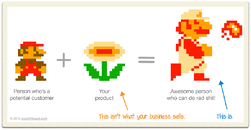Bingo.
It's interesting that this went to a discussion of ego. Something Pete posted this morning struck me between the eyes.
I don't allow recreational doubles divers on a regular sport trip. Could I? Sure, they are a pain in the ass, but I could. I strenuously discourage sidemount divers, because I find it innapropriate on a liveaboard. Could I welcome them? Sure. A number of folks have written me to tell me what an ass I am, and someone's gear choice is their choice yadaa yada yada. Many of these fine PMers never paid to dive in their lives aside from quarry fees, but that's not the point. The point is that my ego has driven away some of the folks I would otherwise reach out to as customers. Even for someone who could give a damn about sidemount, my discussion (which I would keep private if I could only turn back the week) might turn them off. Why? Because they don't want my ego interfering with their ego on the boat. Sadly, big egos are a boat captain and instructor thing. Maybe they are prevalent in the diving industry. Maybe what's wrong with diving is that (in this kinder and gentler teens) customers don't want someone else to be in charge. In the "satisfy my wants, desires, and whims" of the current age, there is no place for a crusty old ass of a captain who thinks that's it's my liability, my rules, my boat.
Maybe that's what's wrong with the dive industry. There's a lot of evidence pointing that way. Just try to tell any of the members of the Board of DEMA how things should be..... The dive shop who thinks his customer is always right may very well do well.




